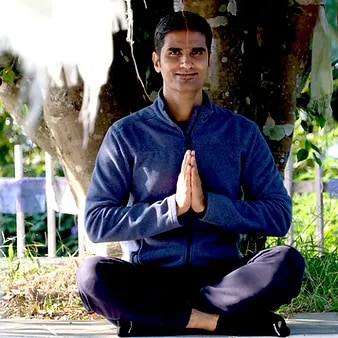Yoga for Better Digestion and Overall Well-being
by Hardik Mehta

In the hustle and bustle of modern life, where stress and sedentary habits are pervasive, maintaining digestive health is crucial for overall well-being. Yoga, an ancient practice that harmonizes the mind, body, and spirit, offers a holistic approach to achieving and maintaining a healthy digestive system. In this comprehensive guide, we will delve into the benefits of yoga for digestion, explore specific yoga poses, and understand the connection between yoga, stress reduction, and improved digestive function.
The Mind-Body Connection: Understanding Digestive Health in Yoga
Yoga is not just a physical exercise; it is a holistic lifestyle that recognizes the profound connection between the mind and body. Stress, a common factor in today’s fast-paced world, can significantly impact digestive health. When the body is stressed, the sympathetic nervous system activates the “fight or flight” response, diverting resources away from the digestive system. Chronic stress can lead to digestive issues such as indigestion, bloating, and irritable bowel syndrome (IBS).
Yoga Poses for Digestion: A Gentle Massage for Your Organs
Apanasana (Knee-to-Chest Pose):

This simple yet effective pose helps release gas and bloating by compressing and massaging the abdominal organs. Lie on your back, bring your knees to your chest, and hold for 10-15 breaths.
Paschimottanasana (Seated Forward Bend):

Forward bends like Paschimottanasana stimulate the digestive organs, enhancing digestion. Sit with legs extended, hinge at your hips, and reach for your toes. Hold for 30 seconds to 1 minute.
Twists (Ardha Matsyendrasana):

Twisting poses wring out toxins and massage the digestive organs. Sit with your legs extended, cross one leg over the other, and twist towards the bent knee. Repeat on the other side.
Marjarasana (Cat-Cow Pose):

This dynamic flow between arching and rounding the spine aids in the movement of the abdominal organs, promoting digestion. Perform in a tabletop position, inhaling as you arch your back and exhaling as you round.
Dhanurasana (Bow Pose):

Bow Pose stretches the entire front of the body, including the digestive organs, improving their functionality. Lie on your stomach, bend your knees, and reach back to hold your ankles.
Breathing Techniques for Digestive Harmony
In addition to yoga poses, incorporating breathing techniques into your routine can significantly enhance digestive health. The following breathing techniques promote relaxation and stimulate the parasympathetic nervous system, which is responsible for the “rest and digest” response.
Deep Belly Breathing: Place one hand on your chest and the other on your abdomen. Inhale deeply through your nose, expanding your abdomen, and exhale completely through your mouth. This diaphragmatic breathing promotes relaxation and aids digestion.
Nadi Shodhana (Alternate Nostril Breathing): This balancing breath technique calms the mind and promotes a state of relaxation. Sit comfortably, use your thumb to close one nostril, inhale through the other, then close the second nostril as you exhale through the first.
Kapalabhati (Skull-Shining Breath): This rapid, forceful breath helps detoxify the body and energize the digestive system. Sit with a straight spine, exhale forcefully through your nose, followed by a passive inhalation. Start slowly and gradually increase the pace.
Mindful Eating Practices: Yoga Beyond the Mat
Yoga for better digestion extends beyond the mat and into your eating habits. Incorporate mindful eating practices to enhance the benefits of your yoga routine.
Chew Mindfully: Take your time to chew each bite thoroughly. This aids in the breakdown of food, easing the digestive process.
Eat in a Relaxed Environment: Create a peaceful atmosphere during meals. Avoid eating in front of screens and savor each bite without distractions.
Hydrate Wisely: Drink water between meals rather than with them. Excessive water during meals can dilute digestive enzymes.
The Stress-Digestion Connection: Yoga’s Impact on Cortisol Levels
Chronic stress is a known contributor to digestive issues. Yoga, with its emphasis on relaxation and mindfulness, helps regulate stress hormones, particularly cortisol. By engaging in regular yoga practice, individuals can lower cortisol levels, reducing the likelihood of stress-induced digestive problems.
Creating Your Digestive Wellness Routine
To reap the full benefits of yoga for digestion, consider creating a personalized routine that includes a combination of yoga poses, pranayama, and mindful eating practices. Aim for at least 20-30 minutes of yoga per day, gradually increasing the duration as your practice evolves.
Yoga Retreats and Digestive Wellness Programs
Embark on a transformative journey toward digestive wellness with specialized yoga retreats and programs designed to rejuvenate both the body and mind. Yoga retreats have emerged as sanctuaries of self-discovery, offering a holistic approach to digestive health that extends beyond the mat. One standout program, in particular, is Sayujya Yoga‘s Holistic 200 Hours Yoga Teacher Training Course.
This comprehensive course, suitable for beginners and advanced practitioners alike, encompasses the multifaceted benefits of yoga, with a specific focus on enhancing digestive well-being. Recognizing the intricate connection between yoga and digestion, Sayujya Yoga’s program delves into a myriad of practices that stimulate the digestive system, promote stress reduction, and instill mindfulness in eating habits.
The course unfolds as a transformative experience, emphasizing the importance of asanas tailored for digestive harmony, breath control techniques to soothe the gut, and mindful practices that extend beyond the retreat setting into daily life. The immersive curriculum is crafted to empower participants with tools for cultivating a balanced and nourished digestive system.
Sayujya Yoga’s 200 Hours Yoga Teacher Training Course stands out for its inclusivity, welcoming both beginners and seasoned practitioners on a journey toward becoming internationally certified yogis. The course, available in both online and offline (Mumbai) modes, commencing from January 15th onwards, provides a unique opportunity to delve into the profound teachings of yoga in the heart of India’s yoga capital.
Whether you choose the serene online setting or the vibrant atmosphere of Mumbai, this training promises to be a gateway to comprehensive well-being. As a certified yogi, you’ll not only gain a deep understanding of how yoga contributes to better digestion but also become a valued member of the global Sayujya Yoga community. Don’t miss this chance to enroll in a program that nurtures your digestive health and sets you on the path to international yoga certification. Admission is now open for courses starting from January 15th—choose the mode that suits you best and embark on a transformative journey toward becoming a certified yoga professional.
In conclusion, yoga provides a balanced and holistic approach to digestive health, addressing both physical and mental aspects. Regular practice of digestive-friendly yoga poses, coupled with breath control and mindful eating, can lead to improved digestion, reduced stress, and enhanced overall well-being. Incorporate these practices into your daily life, and embark on a journey towards a harmonious balance of mind and body through the transformative power of yoga. Your digestive wellness awaits—start your journey today!
About the Author

Hardik Mehta
Hardik is an E-RYT 500 & YACEP (Yoga Alliance Continuing Education Provider), Yoga Alliance, USA. He has been practicing yoga for the last 9 years. Prior to finding his true calling in Yoga, he was working with various corporates for 12 years in the Retail and eCommerce sector.
